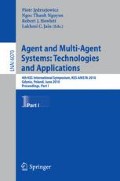Abstract
Negotiation over limited resources, as a way for the agents to reach agreement, is one of the significant topics in Multi-Agent Systems (MASs). Most of the models proposed for negotiation suffer from different limitations in the number of the negotiation parties and issues as well as some constraining assumptions such as availability of unlimited computational resources and complete information about the participants. In this paper we make an attempt to ease the limitations specified above by means of a distributive agent based mechanism underpinned by Multi-Objective Swarm Optimization (MOPSO), as a fast and effective learning technique to handle the complexity and dynamics of the real-world negotiations. The experimental results of the proposed method reveal its effectiveness and high performance in presence of limited computational resources and tough deadlines.
Access this chapter
Tax calculation will be finalised at checkout
Purchases are for personal use only
Preview
Unable to display preview. Download preview PDF.
References
Sycara, K.: Multi-agent compromise via negotiation. In: Gasser, L., Huhns, M. (eds.) Distributed Artificial Intelligence II, pp. 119–139. Morgan Kaufmann, San Francisco (1989)
Rubenstein-Montano, B., Malaga, R.A.: A Weighted Sum Genetic Algorithm to Support Multiple-Party Multi-Objective Negotiations. IEEE Transactions on Evolutionary Computation 6(4), 366–377 (2002)
Kraus, S.: Negotiation and cooperation in multi-agent environments. Artificial Intelligence 94(1-2), 79–97 (1997)
Pruitt, D.: Negotiation Behaviour. Academic Press, London (1981)
Rubinstein: Perfect equilibrium in a bargaining model. Econometrica 50(1), 97–109 (1982)
von Neumann, J., Morgenstern, O.: The Theory of Games and Economic Behaviour. Princeton University Press, Princeton (1994)
Fatima, S., Wooldridge, M., Jennings, N.R.: Comparing Equilibria for Game-Theoretic and Evolutionary Bargaining Models. In: Proceedings of the International Workshop on Agent-Mediated Electronic Commerce V, Melbourne, Australia, pp. 70–77 (2003)
He, M., Jennings, N.R., Leung, H.: On agent-mediated electronic commerce. IEEE Trans. on Knowledge and Data Engineering 15(4), 985–1003 (2003)
Harsanyi, J., Selten, R.: A generalised nash solution for two-person bargaining games with incomplete information. Management Sciences 18(5), 80–106 (1972)
Krovi, R., Graesser, A., Pracht, W.: Agent behaviors in virtual negotiation environments. IEEE Transactions on Systems, Man, and Cybernetics 29(1), 15–25 (1999)
Matwin, S., Szapiro, T., Haigh, K.: Genetic algorithm approach to a negotiation support system. IEEE Transactions on Systems Man and Cybernetics 21(1), 102–114 (1991)
Kennedy, J., Eberhart, R.C.: Particle Swarm Optimization. In: Proc. of IEEE Int. Conf. on Neural Networks, Piscataway, NJ, pp. 1942–1948 (1995)
Alvarez-Benitez, J.E., Everson, R.M., Fieldsend, J.E.: A MOPSO algorithm based exclusively on Pareto dominance concepts. In: Coello Coello, C.A., Hernández Aguirre, A., Zitzler, E. (eds.) EMO 2005. LNCS, vol. 3410, pp. 459–473. Springer, Heidelberg (2005)
Rosenschein, J., Zlotkin, G.: Task oriented domains. In: Rules of Encounter: Designing Conventions for Automated Negotiation among Computers, pp. 29–52. MIT Press, Cambridge (1994)
Barbuceanu, M., Lo, W.K.: Multi-attribute utility theoretic negotiation for electronic commerce. In: Dignum, F., Cortés, U. (eds.) AMEC 2000. LNCS (LNAI), vol. 2003, pp. 15–30. Springer, Heidelberg (2001)
Faratin, P., Sierra, C., Jennings, N.R.: Using similarity criteria to make issue trade-offs in automated negotiations. Artificial Intelligence 142(2), 205–237 (2002)
Raiffa, H.: The Art and Science of Negotiation. Harvard University Press, Cambridge (1982)
Author information
Authors and Affiliations
Editor information
Editors and Affiliations
Rights and permissions
Copyright information
© 2010 Springer-Verlag Berlin Heidelberg
About this paper
Cite this paper
Esmaeili, A., Mozayani, N. (2010). Improving Multi-agent Negotiations Using Multi-Objective PSO Algorithm. In: Jędrzejowicz, P., Nguyen, N.T., Howlet, R.J., Jain, L.C. (eds) Agent and Multi-Agent Systems: Technologies and Applications. KES-AMSTA 2010. Lecture Notes in Computer Science(), vol 6070. Springer, Berlin, Heidelberg. https://doi.org/10.1007/978-3-642-13480-7_11
Download citation
DOI: https://doi.org/10.1007/978-3-642-13480-7_11
Publisher Name: Springer, Berlin, Heidelberg
Print ISBN: 978-3-642-13479-1
Online ISBN: 978-3-642-13480-7
eBook Packages: Computer ScienceComputer Science (R0)

